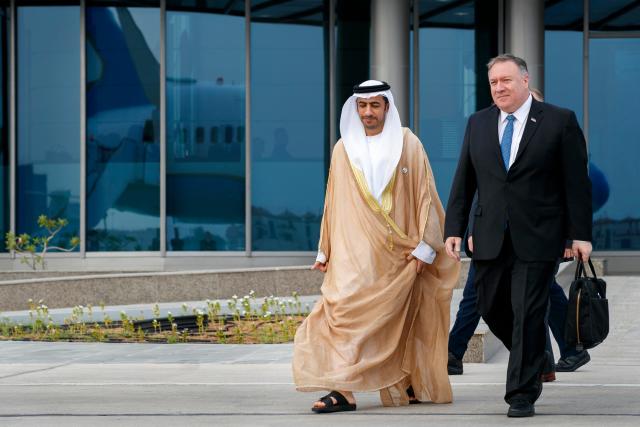
This article is more than
6 year old
"Any attack by Iran on anything American will be met with great and overwhelming force. In some areas, overwhelming will mean obliteration," Trump wrote on Twitter.
The threat came less than a week after Trump called off a planned U.S. missile strike on Iran that the military had been preparing in retaliation for the shooting down of an American drone by Tehran.
His remarks marked a sharp pivot from the softer tone the president has used in recent days toward Iran, in which he urged negotiations over military action and boasted that he was now being seen as a "dove" after cancelling a planned strike on Iran last week.
Trump's latest comments came after the Islamic Republic's leaders mocked new U.S. sanctions and said they foreclosed any possibility of negotiations.
“The fruitless sanctions on Iran’s leadership and the chief of Iranian diplomacy mean the permanent closure of the road of diplomacy with the frustrated U.S. administration,” said Abbas Mousavi, a Foreign Ministry spokesman, according to the state-run IRNA news agency.
Iranian President Hassan Rouhani blasted the sanctions against Iran's Supreme Leader, Ayatollah Ali Khamenei as “outrageous and idiotic,” noting the 80-year-old Shiite cleric has no plans to ever travel to the United States. In remarks broadcast on Iranian state television, Rouhani said the White House is suffering from "mental retardation."
Trump called those statements "very ignorant and insulting."
Trump announced what he called "hard-hitting" new sanctions on Iran at the White House on Monday. He said the measures would deny Iran's leaders access to financial instruments. The new penalties target Khamenei, his office, and other top Iranian officials.
The measures will block transactions involving any property and or other assets that Iran's leaders hold in the U.S. But experts said they would have little practical effect.
Trump unveiled the sanctions as Secretary of State Mike Pompeo traveled to the Middle East to meet with U.S. allies in the region, including Saudi Arabia and the United Arab Emirates. On Tuesday, Pompeo was headed to an undisclosed location, according to a State Department pool report.
Tensions between the U.S. and Iran have been rising for more than a year, beginning when Trump unilaterally withdrew the U.S. from a multilateral deal with Iran aimed at limiting its nuclear program. Under that agreement, the U.S. and other countries lifted crippling sanctions on Iran in exchange for caps on its ability to enrich uranium and other restrictions.
The Trump administration has reimposed those sanctions, aiming to cut Iran's oil exports to zero and force Iran to negotiate a broader agreement that would also curb Iran's ballistic missile program and its support for regional terrorist groups.

Iran and other parties to the agreement have tried to salvage it but that effort has faltered, particularly as the U.S. sanctions started to crush Iran's economy. In recent weeks, the friction between the U.S. and Iran has sharply escalated as Trump administration officials blamed Iran for a series of attacks on oil tankers in the Gulf.
Iran has denied sabotaging those ships, but last week, Iranian officials said they shot down a U.S. drone that had crossed into its airspace. The Pentagon said the unmanned surveillance aircraft was in international airspace.
Trump said the new sanctions were in part a retaliation for the drone strike.
Trump has made it clear that he wants to negotiate with Iran, but Iran has rejected his entreaties. Tehran says he is not a reliable negotiator after he withdrew from the 2015 nuclear deal.
Contributing: Associated Press
This article originally appeared on USA TODAY: Donald Trump threatens 'overwhelming force' against Iran if it attacks 'anything American'